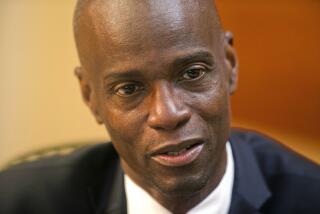Haiti in a Lurch as Judge Flees After Leading Probe
- Share via
PORT-AU-PRINCE, Haiti — “I am not a hero,” Judge Claudy Gassant declared last weekend as he became the latest prominent Haitian to flee this dangerous land.
For nine months, the proud and determined jurist had led the investigation in a case that has become a barometer of Haitian justice--the April 2000 execution-style slaying of Jean Leopold Dominique, Haiti’s most prominent radio commentator and unofficial advisor to then-President Rene Preval.
Gassant endured death threats and harassment as he sought to interrogate witnesses and suspects, among them one of Haiti’s most powerful ruling-party senators. This month, Gassant submitted to prosecutors his final report, reportedly recommending the indictment of the senator and half a dozen others implicated in Dominique’s murder.
Then Gassant resigned, asserting that the government hadn’t done enough to protect him and that another judge had interfered in the probe. Three days later, citing concerns for his and his family’s safety, he boarded a flight to Miami without signing off on the indictments, as required under Haitian law.
The case has captivated an anarchic nation desperate for the rule of law and become a cause celebre for everyone from U.S. actors Danny Glover, Susan Sarandon and Robin Williams to the journalist’s widow.
“The point is, if they can kill Jean Dominique, then we are all in danger. They can kill any of us at any time,” said Michele Montas, who has run her late husband’s station, Radio Haiti Inter, since he was shot four times as he arrived for work.
“If they can kill him and justice is never rendered,” she said, “then the door is wide open for this society to fall apart.”
Of Gassant’s self-effacing assessment of his role in trying to bring her husband’s killers to justice, she said: “Judge Gassant is a proud man who found himself thrown into a case that was too big for most judges.”
Specifically, Gassant’s investigation focused on Sen. Dany Toussaint, a former Haitian army major who fled into exile with President Jean-Bertrand Aristide during the 1991 coup that overthrew Aristide’s elected government.
Toussaint returned to serve as Aristide’s interim police chief after the U.S. military intervened to restore his rule in 1994, and Toussaint was elected to the Haitian Senate last year in a landslide victory.
But, like Dominique, Toussaint has a strong populist following. Many Haitian political analysts say that support was a potential threat to Aristide, a messianic figure whom opponents have cast as a modern-day dictator since his reelection in November.
In the days before Gassant’s resignation, Montas and other Haitian journalists reported that Toussaint had been indicted on charges that he had ordered the hit on Dominique, an acid-tongued broadcaster who had criticized Toussaint’s “ambitions” shortly before the slaying.
Toussaint strenuously asserted his innocence at a news conference this month. He didn’t dispute a pending indictment, but Haitian law requires that the prosecutor and investigating judge sign the charges before they’re official.
Apparently caught in the judicial morass is Haiti’s new, independent justice minister, Gary Lissade.
Lissade, a career lawyer with no party affiliation, produced more than a dozen letters showing that he had provided Gassant elaborate security, including assault rifles, submachine guns and five police officers handpicked by the judge. Lissade even gave the judge two of his own vehicles.
“I said to the judge, ‘Whatever you need, I will provide,’ ” Lissade said, adding that he will have to name a new judge to the case if Gassant fails to return.
“I’m fighting so much for justice,” he said. “The decision in this case will be very, very important for Haitian justice. It will stop the impunity. I would like that Judge Gassant be the Haitian hero in this case.”
But then Lissade agreed: For now, at least, there are no heroes in Haiti.
More to Read
Sign up for Essential California
The most important California stories and recommendations in your inbox every morning.
You may occasionally receive promotional content from the Los Angeles Times.













